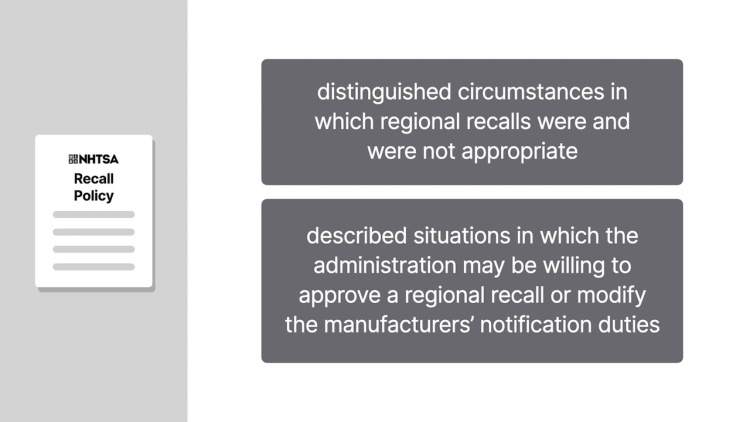Center for Auto Safety v. National Highway Traffic Safety Administration
United States Court of Appeals for the District of Columbia Circuit
452 F.3d 798 (2006)

- Written by Eric Cervone, LLM
Facts
The National Highway Traffic Safety Administration (the administration) (defendant) was the organization responsible for issuing recalls of unsafe motor vehicles. Car manufacturers could also voluntarily issue recalls. In the 1980s, manufacturers began issuing voluntary recalls on a geographically limited basis. The administration initially expressed concerns over these regional recalls. Eventually, however, the administration issued a policy guideline supporting regional recalls under certain conditions. The Center for Auto Safety (the center) (plaintiff) brought suit, arguing that the administration’s policy of allowing regional recalls violated federal safety laws. The center also argued that the administration’s policy guidelines violated the Administrative Procedure Act (the act) because the guidelines were issued without undertaking the requirements of notice-and-comment rulemaking. The administration argued that it had issued only a general statement of policy and thus was not subject to the notice-and-comment requirement. The trial court sided with the administration and dismissed the center’s claims. The Center appealed.
Rule of Law
Issue
Holding and Reasoning (Edwards, J.)
What to do next…
Here's why 905,000 law students have relied on our case briefs:
- Written by law professors and practitioners, not other law students. 47,100 briefs, keyed to 995 casebooks. Top-notch customer support.
- The right amount of information, includes the facts, issues, rule of law, holding and reasoning, and any concurrences and dissents.
- Access in your classes, works on your mobile and tablet. Massive library of related video lessons and high quality multiple-choice questions.
- Easy to use, uniform format for every case brief. Written in plain English, not in legalese. Our briefs summarize and simplify; they don’t just repeat the court’s language.





